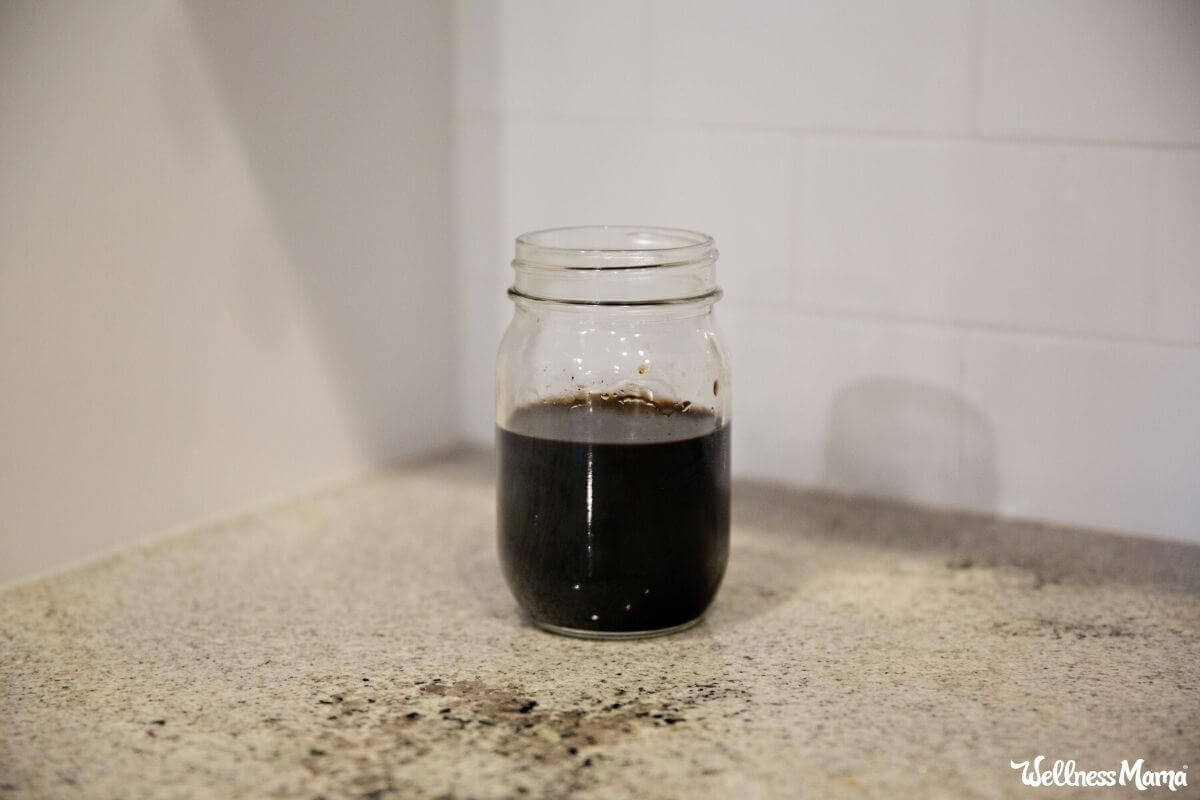I’ve written about how I take fulvic acid to aid in digestion and immunity. But did you know that fulvic acid is a subcomponent of something called humic acid?
Like fulvic acid, humic acid contains a wide variety of minerals, including trace minerals. They are similar in molecular structure, but unique in its benefits and chemical makeup.
Where Does Humic Acid Come From?
Fascinatingly, humic acid is the byproduct of an 80 million-year-old geological process. Humification happens when the right combination of organic matter combines with certain geological conditions, such as pressure and temperature. Humates form as ancient seaweed, plants, vegetation, and fruit trees compress over time, leaving us with a mineral-rich humic acid shown to drastically benefit human health.
Humic acids are important because they help make nutrients in the soil available, instead of locked within the soil. How?
It all comes down to oxidation, which gives humic acids a net negative charge. This helps attract positive ions, like calcium and iron, bind to them in what’s called a cation exchange capacity. This process helps aid in root growth and ultimately plant growth, transferring those important micronutrients into bioavailable food.

Don’t be fooled by the name! Humic acid is not actually acidic but is rather highly alkaline. This is important because the higher the pH values, the more water-soluble it becomes, and therefore more bioavailable to your body.
Why Do We Need Humic Acid?
Humic acid is filled with minerals that are essential for every aspect of your health. Your body needs minerals for things like bone development, heart health, eye health, digestive health, and even mental health. Minerals also work together with other vitamins and enzymes to carry out important chemical reactions in the body.
When something starts to break down in your body, it can almost always be associated with a mineral deficiency.
Why Can’t We Get All Our Minerals From Food?
Ideally, we’d be able to get all our minerals from plant food grown from mineral-rich soil. Unfortunately, large-scale commercial agriculture uses soil-depleting methods and agricultural chemicals like fertilizers and pesticides, which negatively affects the soil pH.
One hundred years ago, farmers made it a priority to maintain soil fertility by using soil amendments, or conditioning the dirt for optimal health. They did this by putting rich compost back into the soil, and rotating crops to let their fields rest and heal in between harvests. When our food production system became commercialized, it was no longer economically feasible for farmers to put back nutrients into the soil on such a large scale. (Although you can in your own home garden!)
As minerals decline in the food supply, health problems inevitably increase. Many heart conditions are associated with deficiencies of minerals like chromium, copper, magnesium, selenium, and potassium.
Thankfully, supplementing with humic acid can help fill in the gaps.
15 Benefits of Humic Acids
Humic acid is filled with essential minerals that your body needs to function at its best. Here are the top 17 reasons your body could benefit from adding it to your shelf of supplements.
1. Prevents Mineral Deficiencies
A deficiency in even a single mineral like magnesium is associated with dozens of conditions and can impact your thyroid, endocrine system, heart, and bones. Humic acid is filled with trace minerals to help your body running smoothly.
2. Alleviates the Common Cold
If you’re feeling sick, humic acid might just be the remedy you need. A 1991 study found that regular doses of humic acid and fulvic acid could help alleviate the symptoms of the common cold quickly and comfortably.
3. Fights Bronchitis
Aside from the common cold, humic acid might be able to help as natural remedy for bronchitis. One comprehensive study found that the use of fulvic and humic acids in chronic bronchitis were even more effective than conventional drug therapies at alleviating symptoms. Best of all, they found it works fast and safely for kids.
4. Gives Plants Minerals From Soil
As I mentioned above, humic and fulvic acids help make nutrients available to plant roots. These acids are abundant in soil organic substances like leonardite, a sedimentation layer near the surface of the earth. When humic acid is present, important minerals and metals become absorbable through cell walls. This process even helps minerals like iron, which is usually not very mobile, transport into the plant.
5. Fights Cancer
Fulvic acid, which is a humus (or in the same family as humic acid), might be able to help aid in cancer treatments. One 2016 study found that fulvic acid seems to kill cancer cells, especially when taken with nitric oxide.
6. Could Improve Thyroid Health
If you struggle with thyroid issues, humic and fulvic acids might be able to help. One 2010 research study on rats found that these acids have a slight hypothyroid effect, which may bode well for those with hyperthyroidism.
7. Protects Against Viruses
Your immune system gets a big boost from humic acid. It helps by gearing up your cell’s defense mechanisms, helping your body more effectively fight viruses like the flu or herpes.
8. Stops the Bleeding in Hemorrhagic Fever
Hemorrhagic fevers (VHFs) are serious illnesses caused by viruses like Ebola and yellow fever. Medline Plus notes that there are no effective treatments for this rare viral infections, but one study found that patients with these infections diseases were able to stop the bleeding, restore circulation, remove clots and improve immunity by taking humic extracts.
9. Offers Powerful Electrolytes
Forget coconut water. If you need an electrolyte boost, fulvic acid is the best thing you can do for your body. In fact, one scientific report states that “the concentration of acidic functional groups in fulvic acids is substantially higher than in any other naturally occurring organic polyelectrolyte.” That’s a pretty good reason to kick that Gatorade habit!
10. Bolsters Your Immunity
There are several immune-boosting properties of fulvic and humic acids, all of which help protect against viruses. One study on rats found that supplementing with these acids “resulted in strong humoral immune stimulation.” Another study went even further, finding that humic acids work together to stimulate both the humoral and cellular branches of the immune system. I include it in my list of natural remedies for cold and flu season.
11. Clears Up Skin Conditions
You can also use humic acid externally to help improve certain skin issues. One study analyzed skin quality by dividing participants into different groups, each using different types of soap. After eight weeks, the group that used soap with humic acid noticed a significant improvement in normal skin appearance.
12. Offers Pain Relief
Patients using fulvic/humic acids for other health purposes reported less pain as well as better sleep in several studies.
13. Reduces Free Radicals
A 1995 study found that these ancient substances may reduce the effect of free radicals in the body.
14. Helps Athletes Refuel
Although there are health benefits to sweating, active people that sweat a lot are at a higher risk for losing their body’s minerals. Supplementing with humic acid is a great way for athletes to replenish their minerals, amino acids, enzymes, phytonutrients, and vitamin levels.
15. Improves Memory
It might be particularly useful for older people to supplement with humic acid, especially when memory problems start to arise. One study found that humic acid can help inhibit memory problems in those with mild to moderate Alzheimer’s Disease, as well as help improve other memory impairments.
Bioavailable Sources of Humic Acid
As with any supplement, if it can’t be effectively used by the body, you are just creating expensive urine. I’ve researched four questions to ask when determining the quality of a particular brand:
- Is it water-soluble? One way to tell how pure and bioavailable humic and fulvic acids are is to see how well they dissolve with and bind to water. The finer and more concentrated the humic and fulvic acids are, the more bioavailable it will be.
- What’s the pH? A high quality source of humic/fulvic acids should be very alkaline, with a pH of at least 10.
- What do the labs say? The best quality humic acids are lab-approved. Read through the results and make sure it’s made with organic compounds, it’s non-GMO, and has not come into contact with acid rain, which could affect the soil pH.
- Did it come from New Mexico? Antony Haynes, a leading researcher, claims that humic and fulvic acid from New Mexico is the highest quality in the world.
What I Use
I’ve evaluated multiple brands of humic and fulvic acid and found one brand that meets the above criteria. BlackMP Living Powder contains over 77 minerals from pure humic and fulvic acid and is sourced from New Mexico. It also contains soil-based organism probiotics in their spore form and has a pH of 10.
Here’s why I recommend this brand:
- It is top quality and contains high concentrations of humic and fulvic acid
- It is sourced from New Mexico
- They make it with certified organic acids
- No GMOs
- No contact with acid rain
- Contains at least 77 minerals and trace elements
- Uses a powerful blend of 5 SBO Probiotics in their spore form
- It has an alkaline pH of 10 when mixed with water
- It is certified drug-free by the Banned Substance Control Group
- Uses a proprietary extraction process with no heat or chemicals
Bottom Line on Humic Acid Benefits
It is frustrating that our food supply has declined to the point that we truly can’t get all of our nutrients from diet alone anymore. I’ll be the first to say you can’t out supplement a poor diet, however, supplementing with humic acid products might be able to help us replenish our bodies and help keep mineral deficiencies at bay.
I was able to negotiate a 50% discount for Wellness Mama readers on Black MP. Use the code wellnessmama and click here for your discount.
This article was medically reviewed by Dr. Scott Soerries, MD, Family Physician and Medical Director of SteadyMD. As always, this is not personal medical advice and we recommend that you talk with your doctor.
Do you take any humic or fulvic acid supplements? Tempted to try?


Leave a Reply